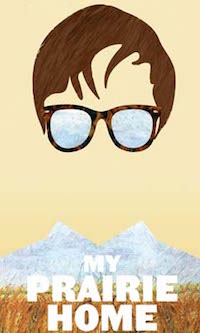| ________________
CM . . . . Volume XXI Number 33 . . . . May 1, 2015
NOTE: Individuals who identify as "trans-gender" often use the pronouns "they", instead of "he/she", "their" and "them", instead of "hers/his". Rae Spoon, the singer whose story is told in My Prairie Home identifies as "trans-gender" and, in respect for that identification, gender-neutral terminology has been adopted in the writing of this review.
Suddenly, the sky and fields vanish, and viewers are inside a roadside restaurant, filled with farmers, truckers, and anyone else who might be on the road, stopping for a bite to eat. A plaid-shirted person seated at the counter turns around, starts strumming their guitar, and begins to sing. As they sing, customer reaction varies from self-consciousness at being filmed, to curious bemusement at the impromptu performance. Most folks just keep drinking their bottomless cups of coffee and working on their breakfast special.
Despite its religious intensity, circumstances in Spoon's Pentecostal family were less than heavenly: their father was schizophrenic, and, even when medication-compliant, he demonstrated "controlled abusiveness", their mother attempted to hold the family together, and while their brothers and sisters were close, the "end times" focus of the family's spiritual life made for an often hellish existence. As the oldest in the family, Spoon took the most bullying because she stood up to it, and realized quickly that the traditional path of early marriage, followed by the raising of a bunch of kids wasn't going to work. They left home early and took refuge at their grandmother's place until they hit the road and began making a living as a musician. At first, they believed that they were lesbian: "that's why I don't fit in, because I'm gay", but, over time, Rae identifies as "gender neutral", believing that gender issues are just "stupid". Clearly, theirs is a different perspective from their home environment in which gender roles were very clearly delineated, and from Rae's perspective, hypocritically so. A veteran of more than 15 coast-to-coast crossings of Canada, as well as visits to the United States, Rae travels largely by Greyhound and is aware that their appearance can be challenging and confusing to others and, sometimes, a real provocation to those for whom androgyny provokes bullying. As they travel from one performance to the next, viewers see Spoon emerging sometimes from the "Ladies" washroom, and sometimes, from the "Men's". Gender neutral bathrooms just aren't common in Greyhound stations or prairie diners. But, despite an androgynous appearance and a wardrobe which is mainly masculine, Spoon's voice is definitely female, haunting, pure, and clear. At the various venues in which they perform, the audience listens, dances, and appreciates the stories and the emotion which emerges as Rae tells stories of their life and then sings the songs which add yet another dimension. Although travelling alone on the way to the next gig, Rae states that "I know what I am without a home." And for Spoon, the prairies are still the closest that they have to a home, a place with a "shared history", which is theirs, as much as anyone's. Despite the horridness of their home life, the prairies is where they grew up, came to terms with who they are, found love (we meet Rae's girlfriend and learn how the two met and became a couple), and continue to explore the boundaries of musical creativity as well as the perspective of what it means to be a "trans-gender" individual in a peripatetic life punctuated by stops in small prairie towns. A prairie girl myself, I have travelled west many times, sometimes on the Trans-Canada and sometimes the Yellowhead Route, the journey always framed by the prairie sky/landscape. My Prairie Home certainly offers an authentic visual experience of that journey: the truck stops, murals painted on the cinderblock walls of the buildings along a town's main street, the neon-signed hotels, and, at night, the pick-up trucks driving around town filled with the teens and 20-year-olds. Spoon's voice is as clear and clean as a cloudless prairie sky, and the stories that voice tells are strong and compelling. And although Spoon appears to be comfortable with their "gender neutral" identification, it is clear that they are still struggling with the outcome of their troubled family upbringing. I'm not sure how this film might work in a high school setting. Teachers running support groups for lesbian/gay/trans teens might wish to screen it, although, at 75 minutes in running time, it's a bit lengthy for many high school viewers. It definitely needs advance viewing in order to determine whether some of the film will be run at regular speed or "fast forwarded". But, if nothing else, My Prairie Home does tell the story of an insightful and creative individual who is continuing to make sense of life and has found a meaningful way to communicate that ongoing struggle. Recommended with Reservations. Joanne Peters, a retired high school teacher-librarian, lives in Winnipeg, MB. Copyright © the Manitoba Library Association. Reproduction for personal use is permitted only if this copyright notice is maintained. Any other reproduction is prohibited without permission.
Next Review |
Table of Contents for This Issue
- May 1, 2015. |

 The prairie landscape is vast, a huge expanse of sky and below the horizon, endless fields of crop grasses: black before seeding, green in summer, golden at harvest time, and, in winter, blanketed with white snow. The opening frames of My Prairie Home provide a prairie vista of golden grain set against a pure blue sky, punctuated by telephone poles and the occasional farm building. But, wait a second, the blue sky is at the bottom of the screen, and the wheat fields are at the top. An unusual perspective, completely suited to the film which follows.
The prairie landscape is vast, a huge expanse of sky and below the horizon, endless fields of crop grasses: black before seeding, green in summer, golden at harvest time, and, in winter, blanketed with white snow. The opening frames of My Prairie Home provide a prairie vista of golden grain set against a pure blue sky, punctuated by telephone poles and the occasional farm building. But, wait a second, the blue sky is at the bottom of the screen, and the wheat fields are at the top. An unusual perspective, completely suited to the film which follows.
 My Prairie Home is the story of Alberta-born Rae Spoon, told via a series of monologues and songs and performances which describe and interpret the sequence of their life. Born and raised in Calgary, their first concert experience was an Evangelical Christian event, held in the Saddledome. Instead of hockey ice, the Dome held a riser with a huge cross, and on that podium, the preacher announced that "Heaven is going to be just like this. . . It's going to be just like this, but it's going to go on forever." Spoon comments, "I think that was the beginning of doubt for me."
My Prairie Home is the story of Alberta-born Rae Spoon, told via a series of monologues and songs and performances which describe and interpret the sequence of their life. Born and raised in Calgary, their first concert experience was an Evangelical Christian event, held in the Saddledome. Instead of hockey ice, the Dome held a riser with a huge cross, and on that podium, the preacher announced that "Heaven is going to be just like this. . . It's going to be just like this, but it's going to go on forever." Spoon comments, "I think that was the beginning of doubt for me."